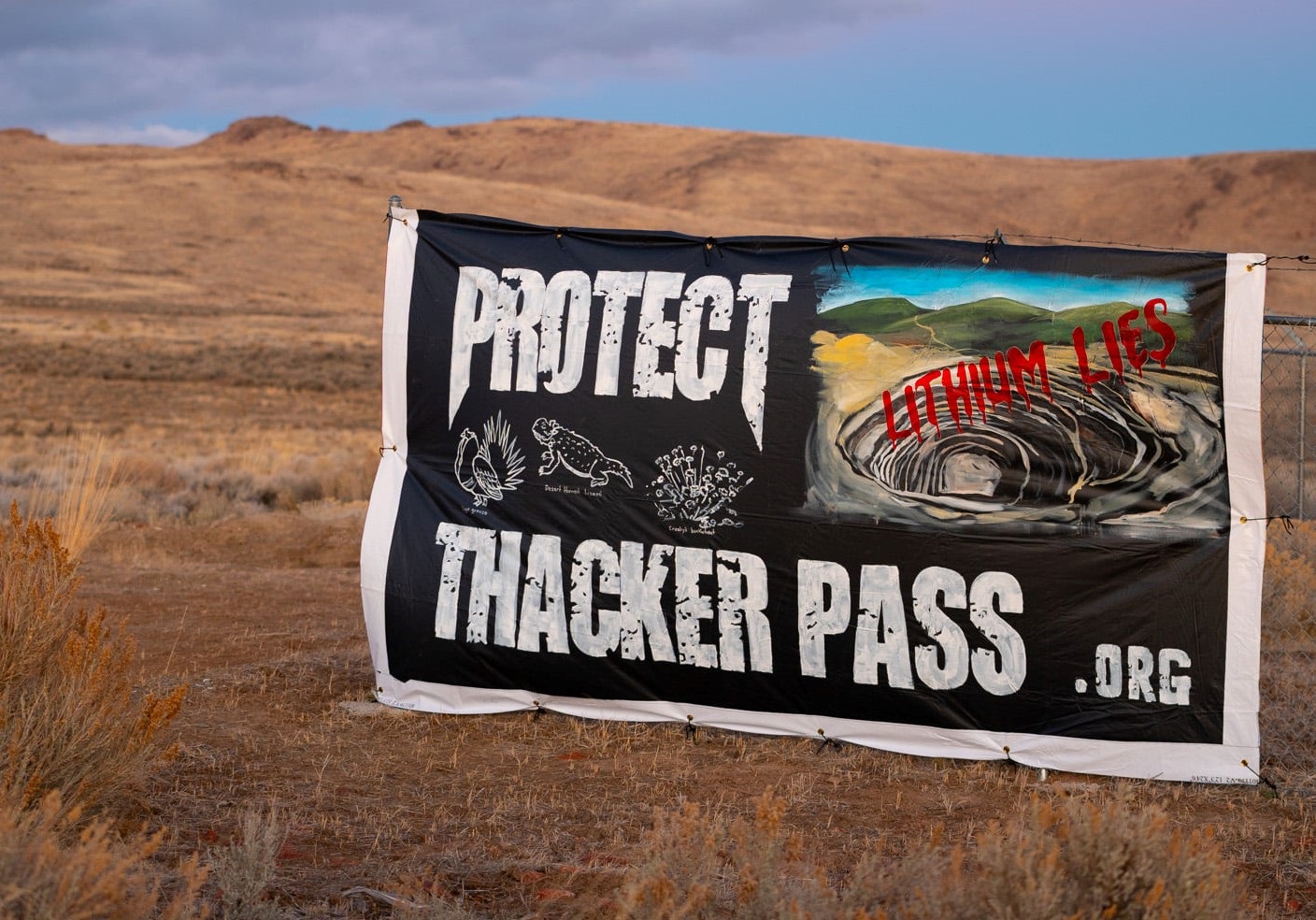
Local indigenous peoples and their environmentalist supporters have rallied outside the federal courthouse in Reno, Nev., as they await a decision on their request for an injunction to stop the Thacker Pass Lithium Mine Project, set to be developed on public lands within the ancestral territory of the Paiute and Shoshone. Opponents have also established a protest camp near the mine site. If the injunction is denied, Lithium Nevada, a subsidiary of Canada-based Lithium Americas, will be able to move ahead with an archaeological survey in preparation for breaking ground on the mine.
The request for the injunction was filed by the Reno-Sparks Indian Colony, the Burns Paiute Tribe and a group of Paiute and Shoshone residents from the Fort McDermitt, Pyramid Lake and Duck Valley reservations calling themselves Atsa koodakuh wyh Nuwu, or People of Red Mountain. They charge that the Bureau of Land Management (BLM) failed to properly consult with impacted indigenous peoples before approving the project.
Thacker Pass is named Peehee mu’huh, or Rotten Moon, in Paiute, and litigants assert it was the site of a massacre of Paiute people in the 19th century. In June, the Reno-Sparks Indian Colony sent a letter to the BLM Winnemucca District Office calling on the agency to halt construction of the mine “until meaningful government-to-government consultation with all of the tribes that are connected to Thacker Pass has concluded.” The letter states: “To disturb this massacre site…would be like disturbing Pearl Harbor or Arlington National Cemetery. Destroying these sites destroys our history.”
The BLM approved the Thacker Pass project in January, just five days before the end of Donald Trump’s presidency. It was one of several projects fast-tracked in the final days of the administration to advance energy and mining projects on public lands, including an Arizona copper mine set to be built on sacred Apache land. (Nevada Current, Reno News & Review, This Is Reno, Nevada Indpendent, Earth Island Journal, First Voices Indigenous Radio)
See our last post on the global lithium wars.
Photo: Protect Thacker Pass





New evidence of massacre at Nevada mine site
Tribal lawyers are asking a IS judge in Nevada to reconsider her earlier refusal to block digging at a proposed lithium mine where they say newly uncovered evidence proves it was the site of a massacre of dozens of Native Americans in 1865.
The new motion filed in federal court in Reno includes an 1865 newspaper report and two eyewitness accounts of how at least 31 Paiute men, women and children were “murdered by federal soldiers” at Thacker Pass.
The accounts were in an autobiography first published in 1929 by labor organizer Bill Haywood. One was from a cavalry volunteer who participated in the slaughter and the other by a tribal member who survived it.
The tribes said in the court filing that the new evidence warrants a fresh review after Judge Miranda Du ruled Sept. 6 the government field notes dating to 1868 that they submitted in their earlier plea for injunctive relief “do not show a massacre happened within the project area.”
Lawyers for the Reno-Sparks Indian Colony and Burns Paiute Tribe of Oregon stated: “The proximity of the Indian Lodgings in the project area, combined with the intervening plaintiffs’ oral histories describing how Paiute people, being hunted by the US Cavalry, hid in Thacker Pass, and especially the new accounts of the massacre make it very likely that the Sept. 12, 1865 massacre happened, at least partially, within the project area.” (AP)
Judge won’t reconsider tribes’ bid to block Nevada mine
A US federal judge has ruled that additional historical accounts two Native American tribes submitted to prove their claim that a proposed lithium mine is on sacred lands where their ancestors were massacred in 1865 still falls short of evidence necessary to temporarily block any digging. District Judge Miranda Du refused the request by the Reno-Sparks Indian Colony and the Oregon-based Burns Paiute Tribe to reconsider her Sept. 6 ruling denying their bid to halt completion of an archaeological survey required before construction of the mine can begin near the Nevada-Oregon line. (AP, Nov. 12)